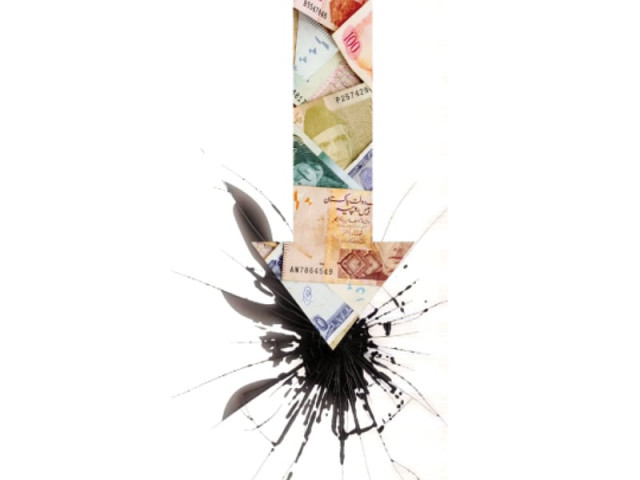Rupee-dollar parity:‘Policymakers comfortable with correction’
Value decreases 60 paisa to close at Rs100.30 in inter-bank market.

The value of the rupee against the dollar decreased 60 paisa in the interbank market on Thursday to close at Rs100.30, with the rupee-dollar parity crossing Rs100 in both open and interbank markets.
After undergoing an unprecedented appreciation of 8.8% between December and July in interbank, the rupee has lost 1.93% value since the beginning of the current month alone.
“The current movement in the exchange rate is due to heightened (political) uncertainty. Hopefully, things will go back to being relatively normal once it goes away,” State Bank of Pakistan (SBP) Director Monetary Policy and acting chief spokesman Dr Hamza Malik said while speaking to journalists at the SBP head office on Thursday.
Referring to the on-going sit-in by an opposition party in front of parliament, Malik expressed hope that the political turmoil in Islamabad would be a ‘short-term blip’.
“Underlying fundamentals of the economy are strong,” he added.
He said the central bank typically has estimates of the expected inflows and outflows of dollars for the next few weeks. Any sudden movement in the exchange rate, while data about the expected flows point to the opposite direction, alerts the SBP immediately, Malik noted. He said the SBP intervenes in such situations by “talking to the market” in order to quell the panic.

SBP holding itself back
However, the continuous slide of the rupee against the dollar suggests that the SBP is holding back this time around. SBP-held foreign exchange reserves were only $5.3 billion in March when it reportedly injected liquidity into the market to strengthen the rupee.
In contrast, SBP-held reserves currently stand at $8.9 billion as per the data released on Thursday. Yet analysts believe there has been no such intervention.
Speaking to The Express Tribune, Standard Chartered Bank Senior Economist Sayem Ali said the SBP has not intervened in the foreign exchange market despite possessing higher foreign reserves.
“(It) indicates that the policy makers are comfortable with the correction in the foreign exchange market,” he said.
Ali also disagreed with the assessment of the SBP director that fundamentals of the economy were strong. Noting that the recent dollar rate movement is driven primarily by sentiments, he said the fundamentals of the economy were already indicating that a correction was due in the foreign exchange market.
“In the monetary policy statement, the SBP clearly highlighted the sharp appreciation of the rupee’s value (against the dollar) and the overvaluation of the real effective exchange rate (REER) index as a concern, leading to a widening trade deficit,” he noted.
Given the government’s estimate of inflows of nearly $9 billion in the financial/capital account and foreign debt repayments of $6 billion in 2014-15, Standard Chartered Bank estimates the exchange rate will be Rs104 to a dollar by December.
Speaking on condition of anonymity, a commercial banker said banks were buying the greenbacks from the interbank market at any given rate in order to sell them on to their clients.
“Liquidity is tight, but the SBP isn’t providing us with any cushion. I suspect the finance ministry wants the SBP to stay away and let the dollar slide to Rs101. It’s playing politics,” he said.
The value of the dollar will come down by Rs2-3 within a week of the resolution of the political conflict, he added.

Published in The Express Tribune, August 22nd, 2014.
Like Business on Facebook, follow @TribuneBiz on Twitter to stay informed and join in the conversation.



















COMMENTS
Comments are moderated and generally will be posted if they are on-topic and not abusive.
For more information, please see our Comments FAQ